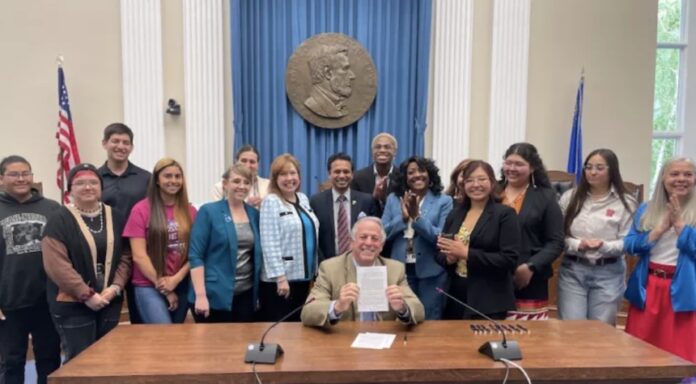Nevada Governor Joe Lombardo held a signing ceremony to codify AB 73. This law allows public school students the right to wear religious or cultural regalia and adornments at graduation ceremonies.
In a press release, Gov. Lombardo wrote the following:
It is my honor to sign AB 73, which allows every student to express their unique religious and cultural identity during their graduation. I am grateful to the teachers, legislators, and students who helped get this legislation to my desk.
Assemblyman Reuben D’Silva, D-Las Vegas was the primary sponsor of this bill. It passed both the Assembly and Senate with unanimous approval.
Assemblyman Reuben D’Silva (D-Las Vegas) announced the passage of a bill that will now allow cultural regalia at high school graduation ceremonies. It garnered universal support & Republican Gov. Joe Lombardo signed it just in time for graduations across NV. @ktvn_reno #nvleg pic.twitter.com/zaCy1x79T0
— Josh Meny (@jmmeny) May 24, 2023
At the signing ceremony, the Governor was joined by students from all over the state, Stacey Montooth Executive Director of Nevada Indian Commission, and Assembly members with Native American ancestry.
The question of what to wear for graduation has caused controversy across the nation. In over a dozen different states, laws have been passed that prevent educational institutions from preventing Native American students from wearing regalia that represents their culture.
Oklahoma has joined the growing list of states that have passed similar legislation. On Thursday, its Legislature overrode Governor Kevin Stitt (R)’s veto on a bill allowing students to wear Native American regalia at high school and college commencements. The measure is set to go into effect on July 1. It received overwhelming support from both the House of Representatives and the Senate, exceeding the two-thirds requirement. Numerous tribes in Oklahoma and Native Americans backed the bill.
Gov. Stitt vetoed this bill in early February, saying that it should be decided by individual school districts. Stitt is a Cherokee Nation member who has had conflicts with many Oklahoma Native American tribes. Stitt’s veto message stated that:
If schools want to allow their students to wear tribal regalia at graduation, then they should be able to do so. The Legislature should not interfere with the choice of schools to allow students to wear traditional cap and gown attire.
In a letter written on Thursday, Cherokee Nation Chief Chuck Hoskin Jr. thanked the Oklahoma Legislature for overriding the veto.
I hope that Governor Stitt realizes that his hostility toward tribes is not going to help him. Oklahomans are a majority who believe in the respect of Native Americans’ rights and collaboration with the tribes that share the land.
Kamryn Yanchick of the Seminole Nation in Oklahoma was denied permission to wear a cap decorated with a beaded design at her 2018 high school graduation. Yanchick, a Native American advocate and policy maker now, stressed the importance of being able “to unapologetically show your pride in the culture at a celebration” without needing permission from non-Native individuals.
“It would have symbolized so much if I was able to wear it,” said Broken Arrow High School graduate Lena’ Black.
Last year, she told us district staff grabbed at an eagle plume dangling next to her tassel. It’s a symbolic item representing her native culture. @KTULNews pic.twitter.com/RmZq9x9ksF
— Daniela Ibarra KTUL (@DanielaIbarraTV) May 17, 2023
Lena Black a Native American ex-student filed a suit against Broken Arrow Public Schools, and two staff after she was forced to remove an eagle’s feather, which is culturally significant, from her graduation cap prior to the high school commencement.
Nevada and Oklahoma have statutes protecting the right to wear tribe regalia. They join Alaska, Arizona, California, Kansas, Mississippi, Montana, North Dakota, Oregon, South Dakota, Utah, and Washington.




